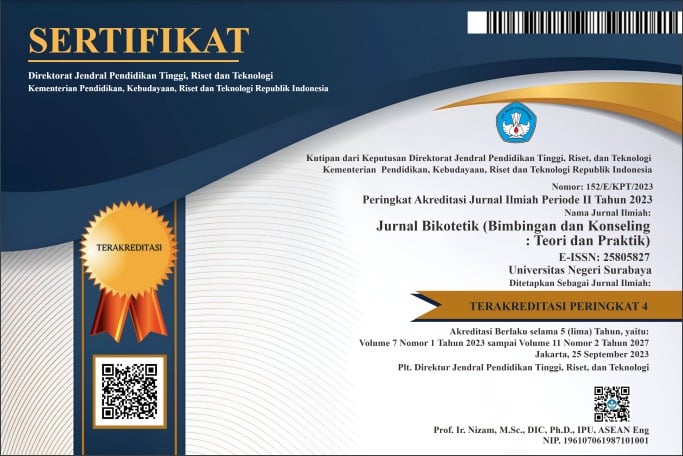MENINGKATKAN KETERAMPILAN EMPATI SISWA SEKOLAH DASAR MELALUI PAKET BIMBINGAN PENINGKATAN EMPATI
DOI:
https://doi.org/10.26740/bikotetik.v1n2.p66-72Keywords:
Peningkatan Empati, Siswa Sekolah Dasar, Paket Bimbingan Peningkatan EmpatiAbstract
The results of a survey by Plan International and International Center for Research on Women (ICRW) survey released in early March 2015 show that 84% of children in Indonesia are experiencing violence in schools. Handling bullying behavior will not be effective if not accompanied by a prefentive effort. The lack of efforts and media prevention of bullying behavior becomes a problem that needs to get a settlement in order to realize the ideals of a character that can be realized. Individual abusers who refer to bullying have low empathy skills and high aggressiveness, so training empathy can be used as an effort to prevent aggressive behavior that refers to bullying.
This study aims to determine the effectiveness of empathy based guidance package based on experiential learning in improving the empathy skills of elementary school students. This research is a type of quasi experiment in which there are experimental groups that will be given treatments in the form of application of empathy based guidance counseling based on experiential learning and control group which will be given empathy material expository. The research was conducted at SDN Bulu Purwoasr. The subjects used were class V students according to the characteristics of the empathy improvement guidance package, which amounted to 32 students and then grouped randomly into the experimental group and the control group. The control group will receive empathic treatments using classical methods while the experimental group will get treatments using empathy based empathy guidance package based on experiential learning. Each will get four treatments with a duration of 35 minutes each session. Empathic skills are measured using the empathy scale developed by M.H Davis, the Interpersonal Reactivity Index (IRI) that has been adapted to Indonesian children's language and has been through expert test, validity test, and reliability.
Based on the results of data analysis, based on Independent T test scores, there are differences in empathy skills possessed by both groups both before and after treatment. It is shown from the score of the independent T test both before and after treatment, has a score of 0.37 and 0.02 or less than 0.05 which is the threshold of the significance score of the T test. In the postest activity, the control group has a mean more score high compared with the experimental group, ie 64.1: 62.9. However, after the treatment was given, the mean score of the control group was lower than the experimental group of 76.5: 79.1. The difference in percentage increase from pretest to posttest was also greater in the experimental group with 16.2% than in the control group with 12.4%. The effective contribution of the use of empathy based experiential learning guidance package is 25.8% -19.5% = 6.3%. It can be concluded that This means that the guidance package of empathy improvement based on experiential learning is effective to be applied to grade V elementary school students.
Keywords: Empathy Improvement, Elementary School Students, Empathy Improvement Guidance Package
References
Andreasson, P. 2010. Emotional Empathy, Facial Reactions, and Facial Feedback. Acta Universitatis Upsaliensis. Digital Comprehensive Summaries of Uppsala Dissertations from the Faculty of Social Sciences 58. 52 pp. Uppsala. ISBN 978-91-554-7840-7.
Andrianie, Santy. 2015. Pengembangan Paket Bimbingan Berbasis Experiential learning untuk Meningkatkan Empati Siswa Sekolah Dasar. Tesis Pascasarjana Jurusan Bimbingan dan Konseling Universitas Negeri Malang: Tidak diterbitkan.
Borba, M. 2008. Building Moral Intelligence. San Fransisco : Josey-Bass.
Coroloso, Barbara. 2007. Stop Bullying (Memutus Mata Rantai Kekerasan Anak dari Prasekolah Hingga SMU). Jakarta: Ikrar Mandiri Abadi
Davis, M.H. 1983. Measuring Individual Differences in Empathy. Journal of Personality and Social Psychology, 44, 113-126.
Goleman, D. 2007. Social Intelligence (terjemahan oleh Hariono S. Imam). Jakarta: PT. Gramedia Pustaka Utama.
Hoffman, M.L. 2000. Empathy and Moral Development: Implications for Caring and Justice. New York: Cambridge University Press.
http://www.m.liputan6.com/news/read/2191106/survei-icrw-84-anak-indonesia-alami-kekerasan-di-sekolah. Diunduh tanggal 15 April 2016.
Kartono, K . 2008. Kenakalan Remaja. Jakarta. Rajawali Pers.
Kolb, D. A. 1984. Experiential learning : Experience as The Source of Learning and Development. New Jersey : Prentice Hall, Inc.
Mardana, I.B. 2006. Implementasi Modul Eksperimen Sains Berbasis Kompetensi dengan Model Experiential learning dalam Upaya Meningkatkan Kualitas Pelaksanaan KBK dalam Pembelajaran Sains di SMP Negeri
Sukasada. (Jurnal Pendidikan dan Pengajaran IKIP Negeri Singaraja, No.4. Hal 782-797)
Nashori, F. 2008. Psikologi Sosial Islam. Bandung: PT. Refika Aditama.
Saripah, I. 20
Model Kognitif-Perilaku untuk Menanggulangi Perilaku Bullying (Model Konseling untuk Korban Bullying pada Siswa Sekolah Dasar). Disertasi Pasca Sarjana Jurusan Psikologi Pendidikan dan Bimbingan Universitas Pendidikan Indonesia Bandung: Tidak Diterbitkan.
Taufik. 2012. Empati Pendekatan Psikologi Sosial. Jakarta: Rajawali Pers.
Downloads
Published
How to Cite
Issue
Section
 Abstract views: 1250
,
Abstract views: 1250
, PDF Downloads: 1101
PDF Downloads: 1101










